Fiestas – Celebrations and festivals in Valencia
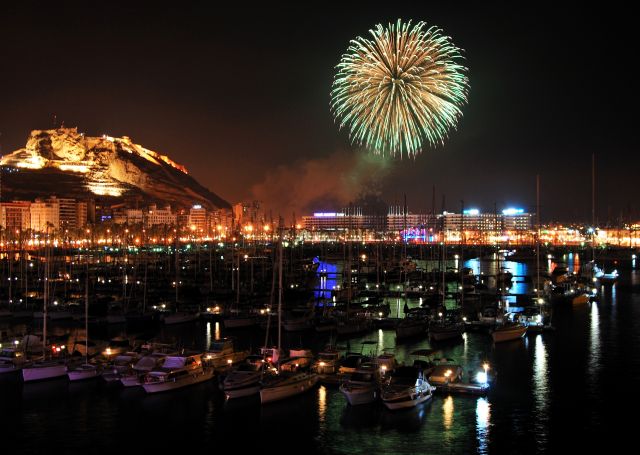
Fiestas, festivals and celebrations in Valencia, Spain. In towns and cities in the Valenica region, there are countless festivals that stand out for their popular participation, colorful and spectacular. They are a cultural tourist attraction with different topics all year around.
They include parties such as the Las Fallas, the Bonfires of San Juan, the Moors and Christians or Easter celebrations. Among the more than thousand festivals celebrated especially they emphasize those that have been declared of International Tourist Interest and National for its historical tradition, the large participation or major impact on the media among other reasons.
Fire, gunpowder, music, colorful, exhibition and entertainment are inherently linked to the celebrations of Valencia, organized for centuries to be lived in the street, in coexistence of residents and visitors because hospitality and invitation to participate items in the festive events becomes a social event in all towns and cities.
Las Fallas
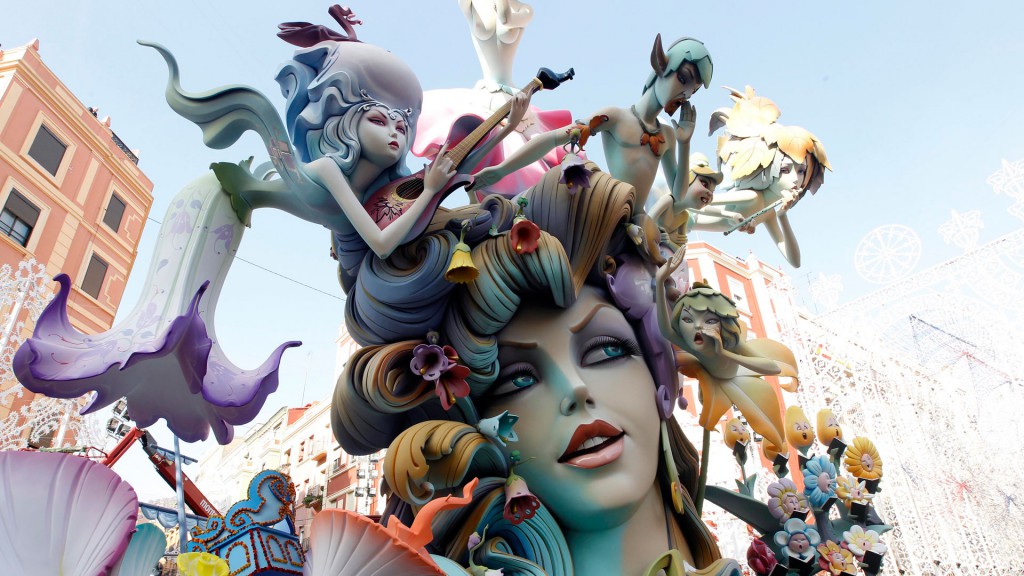
Fiestas, Celebrations and Traditions in Valencia
Las Fallas is a festival ranging from 15 to 19 March with a strong tradition in the city of Valencia and different populations of Valencia. Officially beginning the last Sunday in February with the act of Crida.
Currently, this festival has become a major tourist attraction, as they are classified as celebration of International Tourist Interest. These parties are also called josefinas festivals or festes of Sant Josep, and held in honor of St. Joseph, patron saint of carpenters.
Every Year Valencia is preparing for spring. The streets are filled with joy and bustle with the feast of the Fallas, the greatest exponent of the union of tradition, satire, art and feeling for a land. Valencians live their most international party to the fullest, and its plain and friendly character invites you to visit the city and participate in this festival, which burn all evil and reborn from its ashes to welcome a new season.
Video Las Fallas in Valencia
Easter
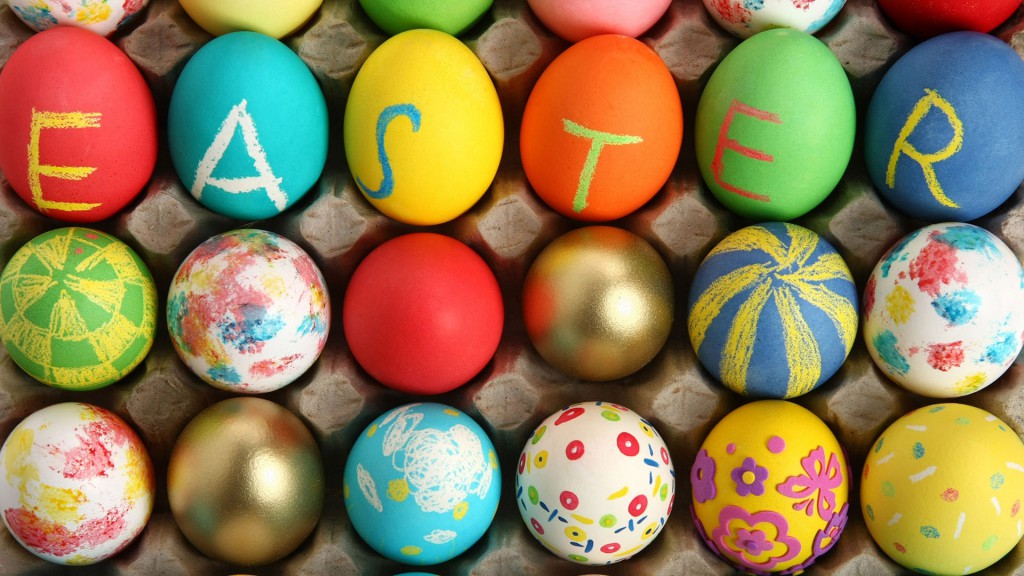
In one of the most emblematic districts of the city of Valencia, Maritim, traditional Easter Marinera takes the place. The Mediterranean character of its inhabitants, makes this festival unique within the framework of celebration of Easter in SPAIN.
Each year, the districts of Cabanyal, Canyamelar and Grao are the scene of the Easter Marinera Valencia, one of the most characteristic religious celebrations of the city. About thirty brotherhoods are responsible for carrying images accompanied by penitents.
Acts of “Semana Santa” officially begins on Palm Sunday and ends on Easter Sunday.
Visit the most important processions of Holy Week Marinera:
Visit to the monuments or Tamborada, Maundy Thursday. Involved only the drums in bands accompanying brotherhoods.
Holy Burial, on Good Friday. It is the act summit. Dominates the silence and recollection. The brothers wear dark clothes like mourning.
Parade, Easter Sunday. colorful ceremony, celebrating the Resurrection. It is a multi-step in which the resurrected contemplate the passage of the brotherhoods without images.
Gran Feria of Valencia
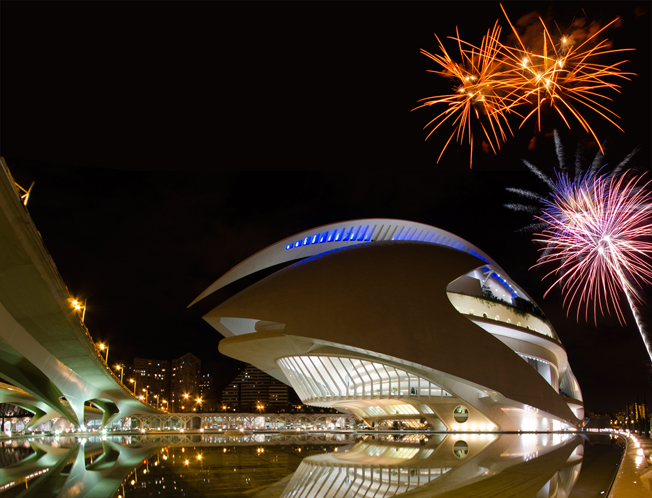
July Valencia prepares to live their traditional Great Fair of Valencia, a month in which the city offers numerous activities and its streets are filled with color and rhythm with outdoor concerts and fireworks by the sea. There is also time for culture, an evening with museums open until dawn and the spectacular Battle of Flowers, a spectacular climax to these days when Valencia vibrates to the rhythm of jazz, pop, rock and smells like gunpowder, roses and daisies.
It opened on July 21, 1871, with a colorful cavalcade, pavilions and exhibitions of plants and selling products in general. Year after year, that led to coincide with the harvesting of crops, those days were held product exhibitions and won, in a playful environment dances and entertainment evenings in the halls enabled the Fair.
Activities at the Feria time are Concerts in Viveros Gardens, Battle of Flowers, Entry of Moors and Christians, Art and Culture, Great Nit, Jazz Festival, International Wind Band Contest “City of Valencia” and Fireworks.
Christmas Eve and Christmas – 24 and 25 December
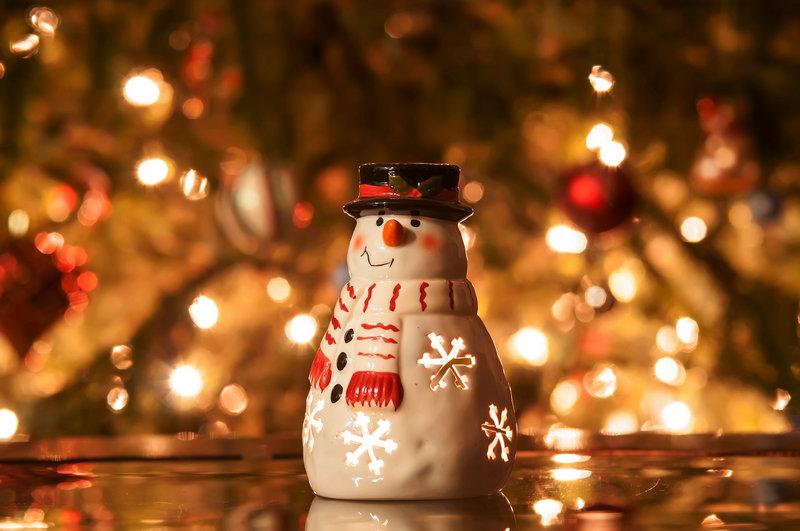
It is traditional for the 24th night families gather around the table to enjoy Christmas Eve dinner and Christmas food. These days, the typical Christmas menus as they could be lamb, bream, cooked typical Christmas, seafood, polvorones, marzipan and nougat accompanied by a local wine and traditional glass of champagne or are tasted achampanada cider, they say it brings luck.
It is traditional that night also attend the Misa del Gallo (so named because it is said that a rooster was the first to witness the birth and was in charge of announcing to the world) held in all churches of the city at 12 approximately night. Especially significant is the one celebrated in the Cathedral with the presence of the Choir of the Cathedral with its traditional carols and other Christmas songs makes this Eucharistic celebration in particular.
Similarly Christmas mass also has the presence of this illustrious Coral. It is also traditional that children receive on Christmas Day the famous “premieres” as a small detail or small amount of money from his closest friends.
New Year’s Eve – 31 December
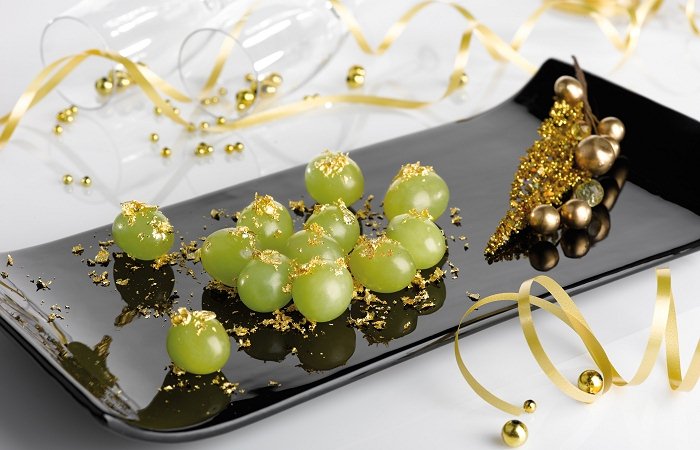
Of course we could not forget the night New Year’s Eve, when after dinner at 12 pm and to the rhythm of the clock chiming all Valencians, we take the 12 grapes of luck.
They are moments of joy, hope and good intentions for the year just begun. Then, many people enjoy a night called cotillion dance party held in different nightlife of the city.
Reyes Magos (Three Kings) – 5 January
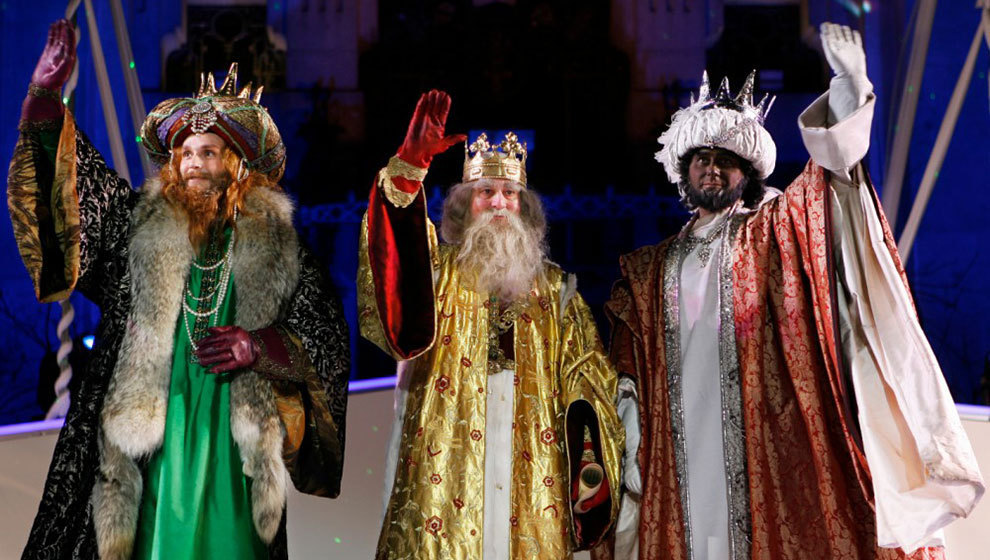
And once I entered the new year, children become again the main protagonists on the night of Jan. 5, when their Majesties. The Three Kings of the East landed at the port of Valencia around 5 pm for, through different streets of the city, get to the Plaza del Ayuntamiento. There, they are perched on the balcony of City Hall. From there they directed a few words to all Valencians touting them. Later Hon. City Hall opens its doors to their Majesties may receive in the Crystal Hall to those children want to talk to them and get their hands a present.
This is a night of excitement that culminates in the morning when getting up, children are at home those gifts that had requested by letter, and some delivered personally to the viziers of the Kings, who arrived a few days before and sauntered by different commercial center, to receive requests for all, and others deposited directly into mailboxes. These endearing festivities end with another culinary tradition, the famous King cake that is eaten on 6 January. It is a type of thin-crust bun ring-shaped and decorated with pieces of candied fruit, symbol of rubies and emeralds that adorned the colorful robes of the Magi. Among the mass is hidden a little surprise and who is crowned king of the house. But there is a broad bean and who finds it undertakes to buy the roscón the following year.
The Virgin of the Helpless (La Virgen de los Desamparados)
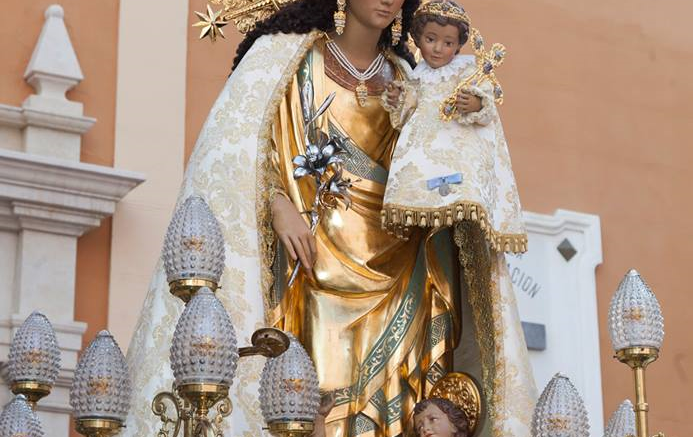
The second Sunday of May, all Valencians have a date with “The Geperudeta” who spend all kinds of honors and tributes. La Mare de Deu dels Desamparats has a long history passed from generation to generation, from father to son.
The Virgin of the Helpless, the Geperudeta (named for the position of the head facing down), besides being the patron saint of the city of Valencia, was canonically crowned in 1923 in the presence of the kings of Spain and various ecclesiastical authorities.
All that history, is continued every second Sunday of May (although the official date was May 8). The Missa de Descoberta, Missa d’Infants, Transfer and procession are the most eagerly awaited by thousands of faithful moments. But it is certainly moving the time when the Valencians more spontaneously express their devotion.
San Juan
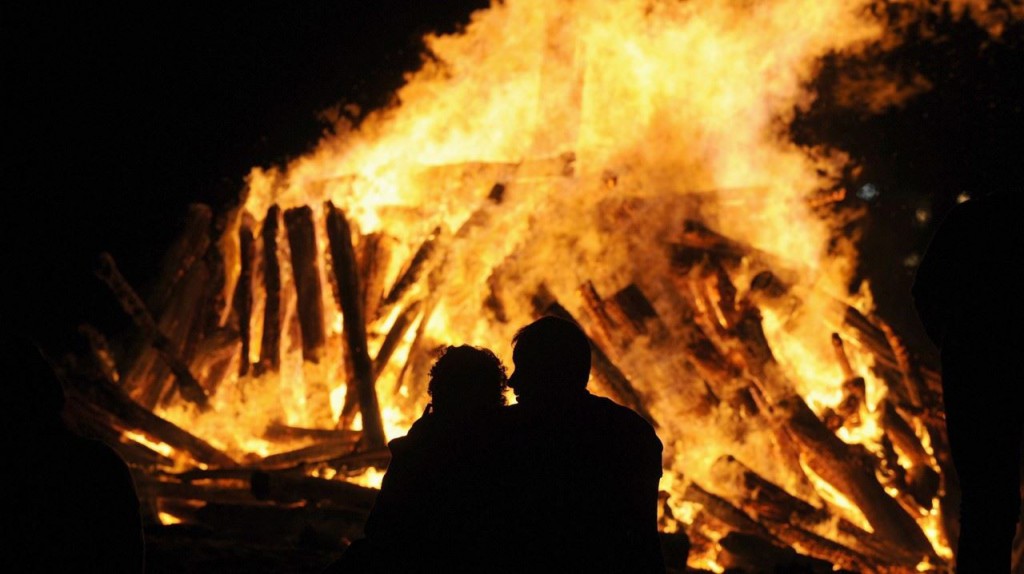
San Juan Night held in Valencia the end of June. With this city welcomes the summer.
It is the shortest night of the year but certainly is a night that is lived with intensity in the Mediterranean.
At Night of San Juan de Valencia, bonfires are lit by the sea, and groups of family and friends gather on the beaches of Valencia, to dine together, perform rituals, make wishes, dance and sing. A fun night that Verbena of San Juan are celebrated throughout the city.
Moon Night of San Juan in Valencia is a magical night, which has been held since antiquity.
Finally, note that Valencia it’s a destination with big demand for car rentals. Don’t forget to book your car hire as soon as you can. RentaCarBestPrice.com letting to compare, book and save up to 70%, get best price and great satisfaction. People’s first choice!
Looking for a Car hire on your holiday? Check here. Best Price Guaranted!
Now a day’s it is very popular to rent a car on your holiday. The majority choose to pick up a car at the Airport. With car rental you and your family have the opportunity to take pleasant day trips, take exciting excursions at your own pace and not be dependent on public transport. By comparing prices of car rental from several companies, you can save a lot of money. Check your prices on car hire now.
Compare and Save up to 80% on your car rental! Best Price Guaranteed!
Links to useful information about Valencia
– Fiestas and festivals in Valencia
– Nightlife in Valencia
– Beaches in Valencia
– Climate in Valencia
– Things to do and see in Valencia
– Valencia Province
– Shopping in Valencia
– Hotels in Valencia
– Restaurants in Valencia
– Facts about Valencia
– Car hire Valencia

